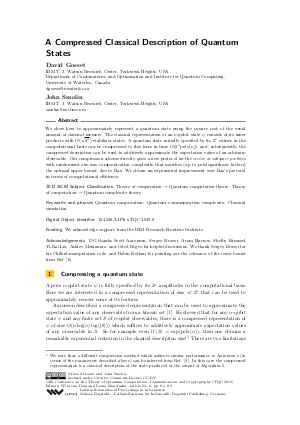A Compressed Classical Description of Quantum States
Authors David Gosset, John Smolin
-
Part of:
Volume:
14th Conference on the Theory of Quantum Computation, Communication and Cryptography (TQC 2019)
Part of: Series: Leibniz International Proceedings in Informatics (LIPIcs)
Part of: Conference: Conference on the Theory of Quantum Computation, Communication and Cryptography (TQC) - License:
 Creative Commons Attribution 3.0 Unported license
Creative Commons Attribution 3.0 Unported license
- Publication Date: 2019-05-31
File

PDF
LIPIcs.TQC.2019.8.pdf
- Filesize: 441 kB
- 9 pages
Document Identifiers
Subject Classification
ACM Subject Classification
- Theory of computation → Quantum computation theory
- Theory of computation → Quantum complexity theory
Keywords
- Quantum computation
- Quantum communication complexity
- Classical simulation
Metrics
- Access Statistics
-
Total Accesses (updated on a weekly basis)
0PDF Downloads0Metadata Views
Abstract
We show how to approximately represent a quantum state using the square root of the usual amount of classical memory. The classical representation of an n-qubit state psi consists of its inner products with O(sqrt{2^n}) stabilizer states. A quantum state initially specified by its 2^n entries in the computational basis can be compressed to this form in time O(2^n poly(n)), and, subsequently, the compressed description can be used to additively approximate the expectation value of an arbitrary observable. Our compression scheme directly gives a new protocol for the vector in subspace problem with randomized one-way communication complexity that matches (up to polylogarithmic factors) the optimal upper bound, due to Raz. We obtain an exponential improvement over Raz’s protocol in terms of computational efficiency.
Cite As Get BibTex
David Gosset and John Smolin. A Compressed Classical Description of Quantum States. In 14th Conference on the Theory of Quantum Computation, Communication and Cryptography (TQC 2019). Leibniz International Proceedings in Informatics (LIPIcs), Volume 135, pp. 8:1-8:9, Schloss Dagstuhl – Leibniz-Zentrum für Informatik (2019)
https://doi.org/10.4230/LIPIcs.TQC.2019.8
BibTex
@InProceedings{gosset_et_al:LIPIcs.TQC.2019.8,
author = {Gosset, David and Smolin, John},
title = {{A Compressed Classical Description of Quantum States}},
booktitle = {14th Conference on the Theory of Quantum Computation, Communication and Cryptography (TQC 2019)},
pages = {8:1--8:9},
series = {Leibniz International Proceedings in Informatics (LIPIcs)},
ISBN = {978-3-95977-112-2},
ISSN = {1868-8969},
year = {2019},
volume = {135},
editor = {van Dam, Wim and Man\v{c}inska, Laura},
publisher = {Schloss Dagstuhl -- Leibniz-Zentrum f{\"u}r Informatik},
address = {Dagstuhl, Germany},
URL = {https://drops.dagstuhl.de/entities/document/10.4230/LIPIcs.TQC.2019.8},
URN = {urn:nbn:de:0030-drops-104005},
doi = {10.4230/LIPIcs.TQC.2019.8},
annote = {Keywords: Quantum computation, Quantum communication complexity, Classical simulation}
}
Author Details
- IBM T. J. Watson Research Center, Yorktown Heights, USA
- Department of Combinatorics and Optimization and Institute for Quantum Computing, University of Waterloo, Canada
Funding
We acknowledge support from the IBM Research Frontiers Institute.
Acknowledgements
DG thanks Scott Aaronson, Sergey Bravyi, Aram Harrow, Shelby Kimmel, Yi-Kai Liu, Ashley Montanaro, and Oded Regev for helpful discussions. We thank Sergey Bravyi for his Clifford-manipulation code, and Robin Kothari for pointing out the relevance of the lower bound from Ref. [Gavinsky et al., 2007].
References
-
Scott Aaronson. Limitations of quantum advice and one-way communication. In Computational Complexity, 2004. Proceedings. 19th IEEE Annual Conference on, pages 320-332. IEEE, 2004.

-
Scott Aaronson and Daniel Gottesman. Improved simulation of stabilizer circuits. Physical Review A, 70(5):052328, 2004.

- Fernando GSL Brandão, Amir Kalev, Tongyang Li, Cedric Yen-Yu Lin, Krysta M Svore, and Xiaodi Wu. Exponential quantum speed-ups for semidefinite programming with applications to quantum learning. arXiv preprint, 2017. URL: http://arxiv.org/abs/1710.02581.
-
Sergey Bravyi and David Gosset. Improved classical simulation of quantum circuits dominated by Clifford gates. Physical review letters, 116(25):250501, 2016.

-
Christoph Dankert, Richard Cleve, Joseph Emerson, and Etera Livine. Exact and approximate unitary 2-designs and their application to fidelity estimation. Physical Review A, 80(1):012304, 2009.

-
Dmitry Gavinsky, Julia Kempe, Iordanis Kerenidis, Ran Raz, and Ronald De Wolf. Exponential separations for one-way quantum communication complexity, with applications to cryptography. In Proceedings of the thirty-ninth annual ACM symposium on Theory of computing, pages 516-525. ACM, 2007.

- Daniel Gottesman. The Heisenberg representation of quantum computers. arXiv preprint, 1998. URL: http://arxiv.org/abs/quant-ph/9807006.
-
Mark R Jerrum, Leslie G Valiant, and Vijay V Vazirani. Random generation of combinatorial structures from a uniform distribution. Theoretical Computer Science, 43:169-188, 1986.

-
Robert Koenig and John A Smolin. How to efficiently select an arbitrary Clifford group element. Journal of Mathematical Physics, 55(12):122202, 2014.

-
Ilan Kremer. Quantum communication. Hebrew University of Jerusalem, 1995. (Master’s thesis).

-
Ilan Kremer, Noam Nisan, and Dana Ron. On randomized one-round communication complexity. Computational Complexity, 8(1):21-49, 1999.

- Ashley Montanaro. Quantum states cannot be transmitted efficiently classically. arXiv preprint, 2016. URL: http://arxiv.org/abs/1612.06546.
- QISKit, the quantum information software kit. URL: https://qiskit.org.
-
Ran Raz. Exponential separation of quantum and classical communication complexity. In Proceedings of the thirty-first annual ACM symposium on Theory of computing, pages 358-367. ACM, 1999.

-
Oded Regev and Bo'az Klartag. Quantum one-way communication can be exponentially stronger than classical communication. In Proceedings of the forty-third annual ACM symposium on Theory of computing, pages 31-40. ACM, 2011.

